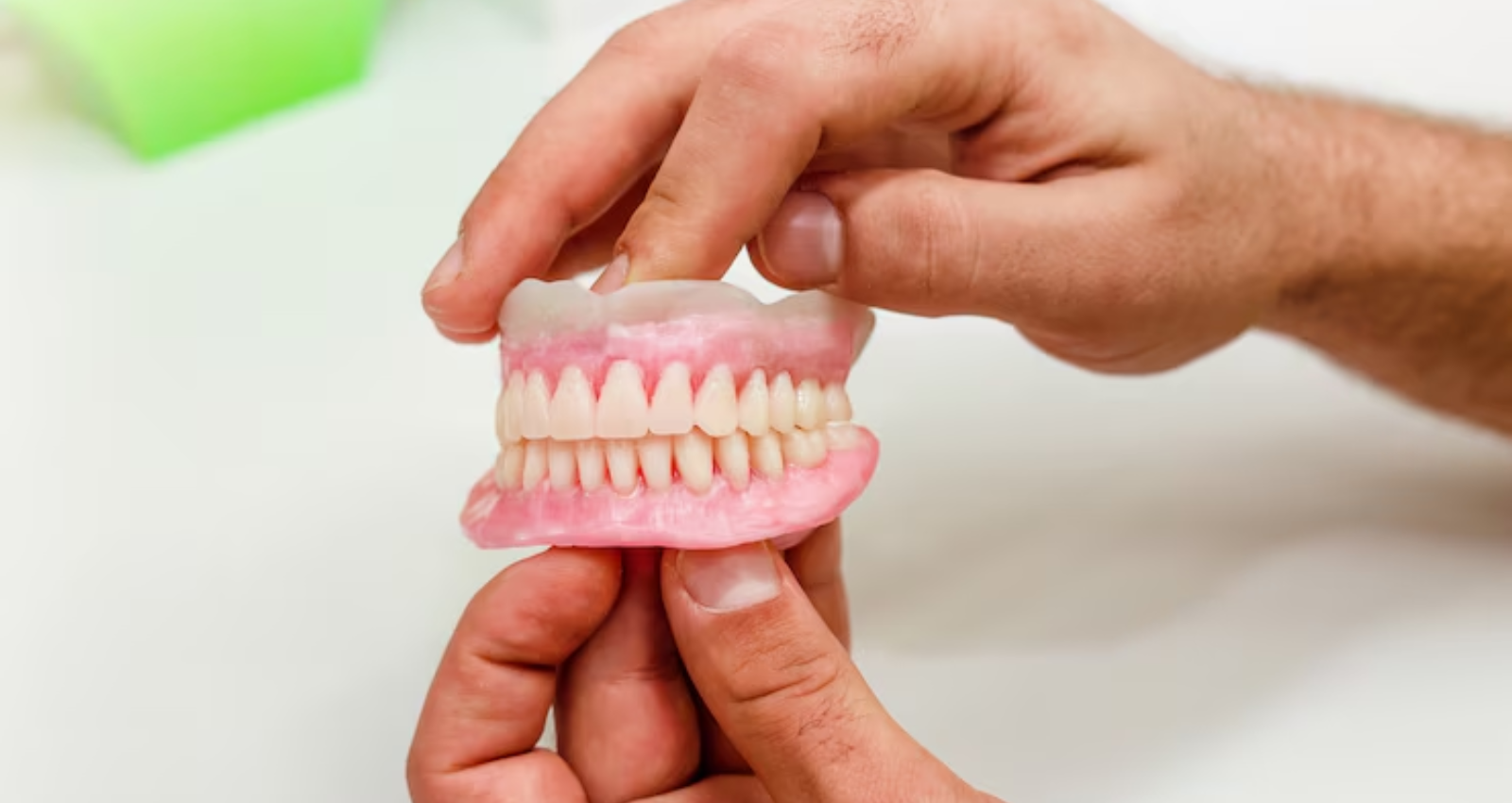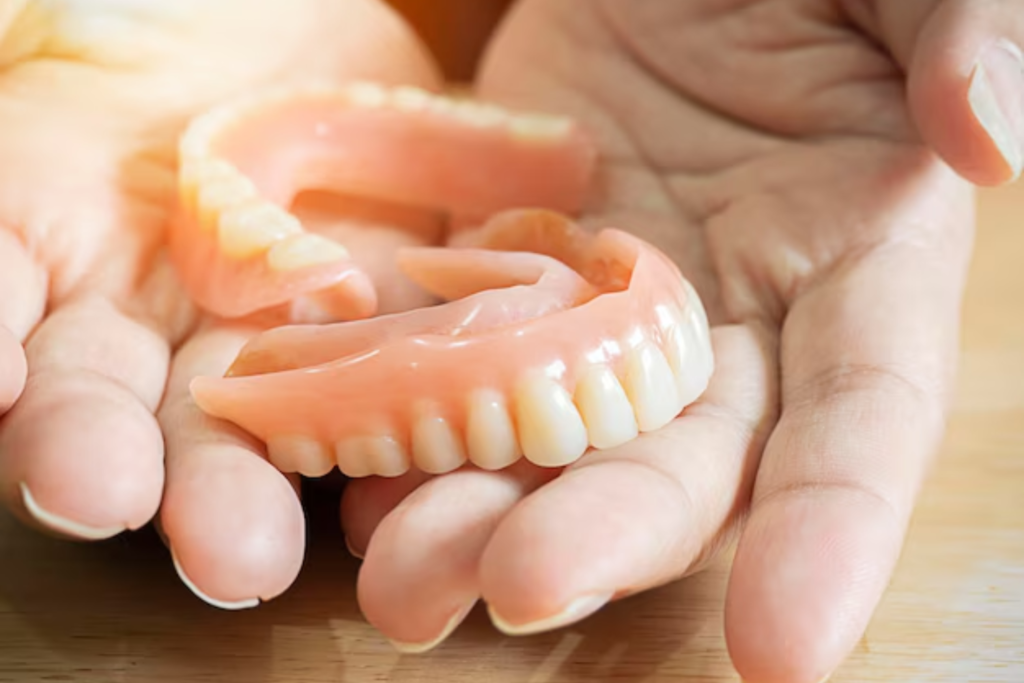Published on June 18, 2024

Missing teeth? Dentures can be a lifesaver, restoring your smile and chewing ability.
But what about your jawbone? Does it get a strength boost under those dentures?
The answer might surprise you. Understanding the relationship between dentures and jaw bone health is essential for those considering this dental solution. This blog delves into how dentures impact jaw bones and whether they can help prevent bone loss.
Jaw bones provide structural support for teeth, ensuring they remain anchored in place. When teeth are lost, the lack of stimulation can lead to bone resorption, weakening the jaw structure over time. Dentures can potentially mitigate this process, but their effectiveness depends on several factors, including fit and the type of denture used.
By exploring the anatomy of jaw bones, the effects of tooth loss, and how dentures function, we can better understand their role in preserving jaw bone health.
Impact of Tooth Loss on Jaw Bones
Tooth loss significantly affects jaw bone density, leading to various oral health issues. Understanding these consequences can help address and prevent further complications.
Consequences of Missing Teeth on Jaw Bone Density:
- Bone Resorption: When teeth are missing, the jaw bone lacks stimulation, causing it to shrink and lose density.
- Structural Weakness: Reduced bone density weakens the jaw structure, making it more susceptible to fractures.
- Facial Changes: Loss of jaw bone density can lead to facial sagging and an aged appearance.
Bone Resorption and Its Effects:
- Rapid Decline: The jaw bone can begin to resorb as soon as six months after tooth loss.
- Oral Health Complications: Bone resorption can lead to misalignment of remaining teeth and difficulty with dentures.
- Difficulty in Dental Procedures: Bone loss can complicate future dental treatments, such as implants, due to insufficient bone support.
How do Dentures Work?
Dentures provide an effective solution for replacing missing teeth, restoring both function and aesthetics. They come in two main types, each serving a specific purpose.
Types of Dentures:
- Complete Dentures: Used when all teeth are missing, complete dentures replace an entire arch of teeth. They sit directly on the gums and are held in place by suction or adhesive.
- Partial Dentures: Designed for patients with some natural teeth remaining, partial dentures fill the gaps and are anchored to existing teeth with clasps or precision attachments.

Mechanism of Dentures in Replacing Missing Teeth:
- Support and Stability: Dentures distribute the force of chewing across the gums and jaw, providing stability and support.
- Restoration of Function: They enable normal eating and speaking, improving the quality of life.
- Prevention of Teeth Shifting: Partial dentures prevent remaining teeth from shifting into gaps, maintaining proper alignment.
- Aesthetic Improvement: Dentures restore the natural appearance of the smile, enhancing facial structure and confidence.
Do Dentures Protect Jaw Bones?
Dentures can provide many benefits, but their effectiveness in protecting jaw bones is more nuanced. They play a role in maintaining oral health, but their impact on jaw bone preservation depends on several factors.
Factors Influencing Jaw Bone Health with Dentures:
- Fit and Stability: Well-fitted dentures can help distribute chewing forces evenly, reducing bone resorption.
- Material Quality: High-quality denture materials can improve comfort and function, promoting better bone health.
- Adhesive Use: Proper use of adhesives can enhance denture stability, which indirectly supports bone health.
- Dentist Supervision: Regular dental check-ups ensure dentures remain well-fitted and effective, reducing bone loss risk.
Research and Studies on Bone Preservation:
- Bone Resorption: Studies indicate that dentures, especially complete ones, do not prevent bone resorption. Over time, the lack of tooth roots can lead to gradual bone loss in the jaw.
- Implant-Supported Dentures: Research shows that implant-supported dentures can better protect the jaw bone. Implants mimic natural tooth roots, stimulating the jaw bone and preventing resorption.
- Pressure Distribution: Traditional dentures may not distribute pressure evenly across the jaw, leading to localized bone loss. Conversely, well-fitted dentures help in better pressure distribution, which can slow down bone resorption.
Benefits of Properly Fitted Dentures
Properly fitted dentures offer numerous benefits beyond improved aesthetics and functionality. They play a crucial role in maintaining oral health and preventing further complications.
Maintaining Jaw Bone Structure:
- Even Pressure Distribution: Well-fitted dentures distribute chewing forces evenly across the jaw, reducing localized pressure that can accelerate bone loss.
- Stimulating the Jaw: Properly fitted dentures help mimic the natural action of teeth, providing some level of stimulation to the jaw bone, which helps maintain its structure.
Preventing Further Bone Loss:
- Reducing Bone Resorption: A secure fit minimizes movement and friction, which can prevent the acceleration of bone resorption.
- Improving Comfort and Function: Properly fitted dentures enhance comfort and functionality, encouraging regular use and better overall oral health, which indirectly helps preserve bone density.
- Supporting Facial Structure: Well-fitted dentures help maintain the shape and structure of the face, preventing the sunken look that often accompanies significant bone loss.
Dentures not only restore the functionality and appearance of missing teeth but also play a crucial role in maintaining jaw bone health. Properly fitted dentures distribute pressure evenly and help prevent further bone loss, supporting overall oral health. Regular dental check-ups ensure the best fit and maximize these benefits, making dentures a valuable investment in your long-term dental well-being.
